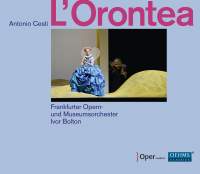Texte paru dans: / Appeared in: |
|
|
Outil de traduction (Très approximatif) |
|
|
Reviewer:
Iain Fenlon
Elsewhere Louise Adler settles down, after some striking opening passagework, to a finely wrought and affecting account of Silandro’s set-piece ‘Addio Corindo’, one of the high points of the score. There are also stylish performances from Guy de Mey and the countertenor Xavier Sabata, who makes an impressive debut in the role of the destitute painter Alidoro. Orontea herself, the fictitious Egyptian queen whose love for the artist provides the central thread in a libretto that revolves around the usual tropes of mistaken identities and the tricks of fate, is affectingly portrayed by Paula Murrihy, notably in the rapidly changing moods of ‘Intorno all’idol mio’. Ivor Bolton directs the combined forces of the Frankfurt Opera and Museum Orchestra with his accustomed flair and keen sense of period style. While the chief beneficiaries of the revival of early Italian Baroque opera have principally been Monteverdi and Cavalli, L’Orontea has not been without its champions, beginning with the 1961 Milan revival starring Teresa Berganza in the title-role. René Jacobs subsequently put the work on the turntable with his 1982 three-record set (Harmonia Mundi, 2/83), and this new recording, for which a new edition based on the Cambridge manuscript once owned by Samuel Pepys has been made by the Spanish musicologist Alvaro Torrente, opens fresh vistas. Perhaps the time has come to explore more of Cesti’s 11 known operas. Written as private entertainments rather than works for the public theatres, they often call upon forbidding stage machinery and sumptuous settings, but that should not prevent studio attention being paid to La Dori and the theatrically over-sized Il pomo d’oro, both of which deserve to be recorded. |
|




